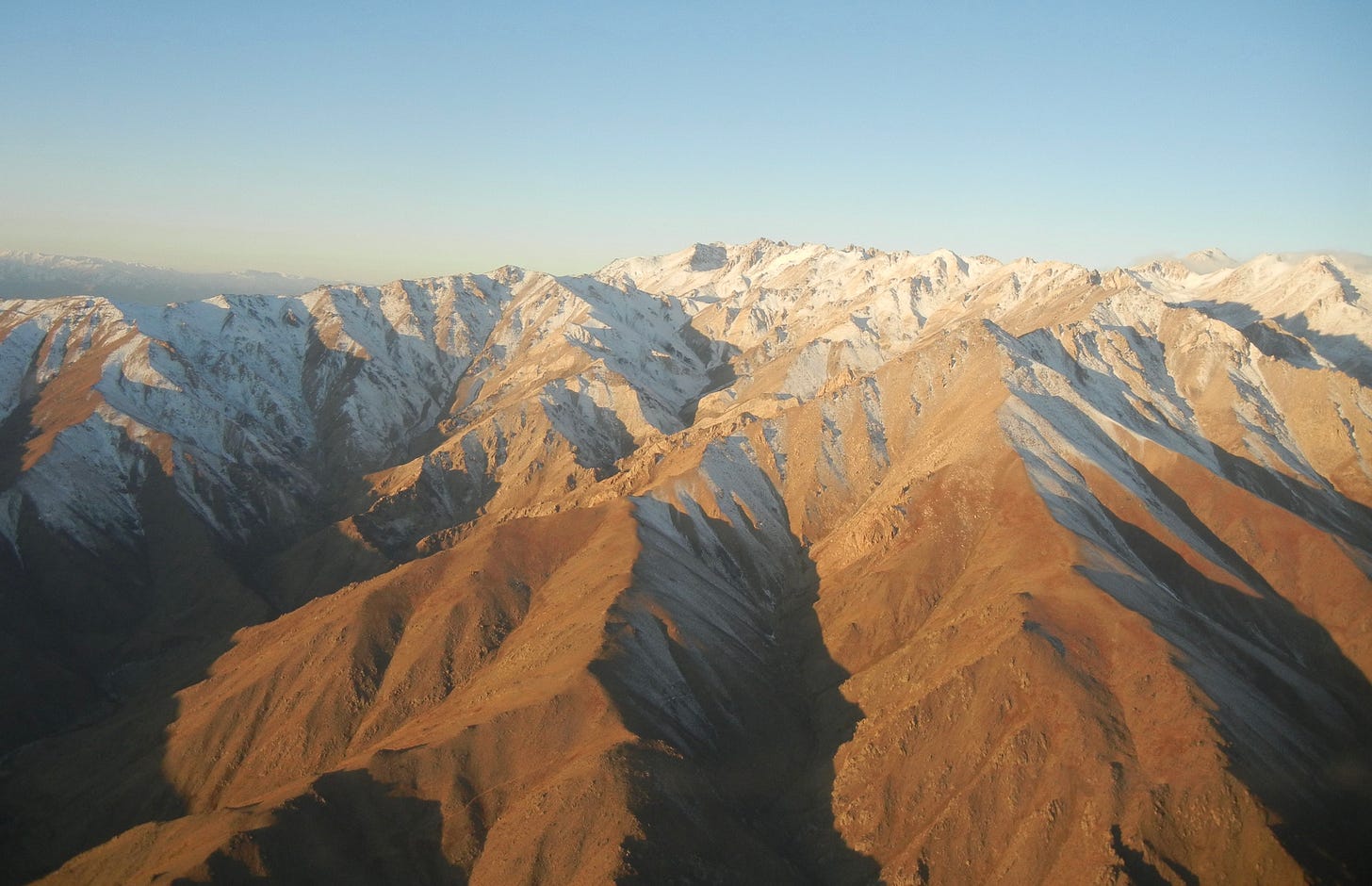Letter from the Editor
I usually find out from some oblique social media post. We all know better than to identify casualties till the family has been notified, so it’s black bands over unit patches, recriminations, and Valhalla testimonies to brotherhood, phone numbers, and “call me if you need to talk.” I know that works sometimes. It didn’t this month. I can’t tell you how many there have been, but I know there were at least three I knew or had some connection to over the July 4th weekend and four more since. One of them was a friend. We were supposed to talk a few months ago, but he rescheduled on me twice and I figured we would get to it when we got to it because friends are forever. Now we won’t. We can’t. Because he’s dead. Turns out that’s forever too. We’ve been killing ourselves for years. We’re better at it than countless enemies proved to be over a twenty-year war, and I am no wiser about how to stop it today than I was thirty years ago when a Marine in my battalion drew his M16A1 for qualification fire, loaded it with three rounds he’d saved from the day before, and jammed it in his mouth on three-round burst. He was dead before daybreak but lay in the sun for a long time while investigators processed what seemed like a black-and-white scene to me. Marines from my platoon described brain matter hanging from the armory’s chain link fence. In the intervening decades, there have been more shootings, some hangings, a Marine who got drunk and laid down on a train track. I hope he was asleep. Another wheelied his motorcycle into the back of a city bus, 83 mph on a main street. I don’t know that it was intentional, I just don’t know that he cared. One guy died in his laundry room with SWAT at the door, another in a FOB porta-shitter. The note said he couldn’t take the stress of waiting for the insurgents to get him. Surrounded by people who would have fought to their own deaths to save him, he killed himself in a porta-shitter so someone else couldn’t. That’s the illogic of suicide. It doesn’t make sense to those of us left behind. Maybe it didn’t make sense to him until it did. I don’t know. I didn’t get a chance to ask. We just hosed out the porta-shitter and held another memorial. If I seem callous, I am. I have to be to keep moving forward against a relentless enemy. Otherwise, the weight of it all would crush me. We have countless organizations, people, and dollars arrayed against the stalking specter of veteran suicide. And it just keeps coming. I fought a war for twenty years. It made me both harder and more empathetic. That’s where I am with veteran suicide: exhausted, yet still possessed of an infinite number of fucks to give. I will always talk and write and hug and beg you to just stay here for another minute. Lethal Minds Journal is here for you. Patrol Base Abbate is here for you. We’re all here. You just have to reach out. Fire for Effect, Russell Worth Parker Editor in Chief - Lethal Minds Journal Submissions are open at lethalmindsjournal.submissions@gmail.com. Dedicated to those who serve, those who have served, and those who paid the final price for their country.
Two Grunts Inc. is proud to sponsor Lethal Minds Journal and all of their publications and endeavors. Like our name says we share a similar background to the people behind the Lethal Minds Journal, and to the many, many contributors. Just as possessing the requisite knowledge is crucial for success, equipping oneself with the appropriate tools is equally imperative. At Two Grunts Inc., we are committed to providing the necessary tools to excel in any situation that may arise. Our motto, “Purpose-Built Work Guns. Rifles made to last,” reflects our dedication to quality and longevity. With meticulous attention to manufacturing and stringent quality control measures, we ensure that each part upholds our standards from inception to the final rifle assembly. Whether you seek something for occasional training or professional deployment, our rifles cater to individuals serious about their equipment. We’re committed to supporting The Lethal Minds Journal and its readers, so if you’re interested in purchasing one of our products let us know you’re a LMJ reader and we’ll get you squared away. Stay informed. Stay deadly. -Matt Patruno USMC, 0311 (OIF) twogruntsinc.com support@twogruntsinc.com
In This Issue
Written Word
Memorial Day Reflection
Book Excerpt: Tough Rugged Bastards
Counterfeit
The World Today
Never Tell Me the Odds: Will-Based Options for Deterring an Invasion of Taiwan
Poetry and Art
Sunrise
Hold Fast
Guitars
Man in the Sea
Written Word
Fiction and Nonfiction written by servicemen and veterans.
Memorial Day Reflection
Ron Jansen
The leaves of the pin oak and maple trees are completely still. The grass, if you call it that, is overdue for cutting. It's a collection of clover, dandelion and other weeds that would make any suburban dad uneasy. Songbirds in a hundred trees, sing a hundred different tunes, in the early morning calm.
I sit alone on a park bench covered in dew. The bench is new and the composite slats of the seat and back are not yet faded by the sun and time. The bench was installed when the memorial was moved to this location after the old reserve training center was abandoned. This new place is calm, peaceful and idyllic -- a polar opposite of the place where the five Marines from Alpha Company, 1st Battalion, 24th Marine Regiment, lost their lives over 17 years ago.
Each of the five had lives outside of the Marine Corps. The Reserves were funny that way. We worked jobs, attended school, raised families, mowed grass, went to church, played softball, went fishing, fixed cars, met friends -- all while living out an alternate reality. A reality that involved preparing for war during a time of global conflict,while facing nearly unprecedented peace and prosperity back home.
These men, with their faces etched in granite, left a life of ease and vast opportunity to report for training in June 2006. They were to prepare for war in a place that had no connection to their current lives. Arriving minimally equipped at Camp Pendleton their pack-out consisted of simple things: a green, tube-shaped seabag full of boots and clothing; a backpack full of military gear; a set or two of civilian clothes for weekends off-base… and hopes for a better tomorrow.
A handful of crumpled, red, white, and blue carnations and an open beer lay at the foot of each monument. No doubt a sixth beer was drunk there as a toast to the fallen.
I feel deep guilt as I sit in their presence. Guilty that I gave so little when they gave so much. Guilty that I didn’t come to know them better while they were still alive. Guilty for not being there when they died. I feel the shared guilt of those who were with them when they died. Those whose actions were directly related to their deaths.
No one is to blame because everyone is to blame. I know the heaviness that their comrades feel and can sense their unspoken questions.
Why did we go down that road? Why did we call for the Quick Reaction Force on that miserable, muddy October day? Why didn’t we have our headlights on to see the pressure plate before they hit it? Why did we cross the road there? Why didn’t I see the shooter before he fired?
As I sit, I realize that mostly I feel the guilt of living when they did not. I feel the guilt of wasted opportunity; that somehow I’m failing to honor them within the life I am so privileged to live. Sitting and looking at their faces, arranged in a semi-circle in front of me, makes me feel like an imposter.
I reflect for a moment on how I would feel if I were one of the granite faces in the circle. My perspective shifts from that of an outsider looking in to that of an insider looking out at a man sitting on a park bench. If I were one of them, I would like to think I had grace and understanding for the living. I would like to assure those I fought alongside that death is hard and leaving was difficult but we all faced the struggle together. There is no guilt laid on those who made it back home. I would encourage -- not blame. I would grieve missing out on life’s great pleasures but would also marvel at the opportunities in front of those who are lucky enough to be alive. Not the opportunities of wealth, success, or settling old scores—but much greater opportunities of redemption, forgiveness, and love.
I would want the man on the outside to know that it is okay for him to acknowledge the weight of loss, but also to live in gratitude for all he has gained, especially that we journeyed together and fought a good fight. That death is part of life and allowing ourselves to grieve death, is one of the things that helps us feel fully alive.
I’ve removed my face from the granite, assuming the place of the man outside the fenced enclosure, once again. I’m standing now and looking over the winding creek that runs beyond the memorial. I watch the living water below and feel grateful for the living water inside of me.
The sun is now up and filtering light through the trees. Down the hill, a group of bicyclists pedals steadily along the path on their holiday morning ride. It is time for me to go. My kids will be awake when I get home, looking for breakfast and eager to know what is in store for their day off of school.
I feel a twinge of guilt as I walk to my truck, but the guilt is quickly replaced by gratitude for the opportunity to live another day in a land that produced men like these.
Ron Jansen is a Marine veteran and author of "An Otherwise Healthy Person: A Marine's Story of Going to Fallujah and Fighting to Come Home"
Book Excerpt: Tough Rugged Bastards
John Dailey
Tough Rugged Bastards is currently available for pre-order with a release date of August 13th. Order your copy here.
Excerpt from Chapter 10: Good at War
As the neighborhood slept, our line of vehicles crept through the narrow residential side streets on the outskirts of Baghdad. We drove blacked-out, relying on infrared headlights and night vision goggles to negotiate the tight turns. In the turrets, gunners alternated fields of fire. The muzzles of .50 caliber machine guns and 40-millimeter grenade launchers pointed into the darkness, slowly swaying back and forth like charmed cobras, an instant from spitting death. Each man in the open-backed vehicles scanned rooftops and blind corners, M-4 carbine barrels protruding like porcupine quills. The helicopters that provided overwatch as we raced down the highway leading to this place held back, turning slow circles in the sky far enough away to prevent disturbing the early morning quiet.
I was driving the second vehicle. We were responsible for navigation. Ben sat in the passenger seat, his head buried in a laptop screen, "Next right, and the second left." His whisper crackled through fifty radio headsets.
Each team named their gun truck using the theme of war gods. We stenciled the names in big block letters with flat-black paint along the front fenders to distinguish them: Thor, Odin, Mars, Ares, Juno, and Tyr. We picked old gods of legend and lore. No one suggested just 'God' or 'Allah.' While I'm sure that proposal wouldn't have been appreciated, there is certainly the case to be made that they are the biggest war gods of all. We have fought in their names for millennia, and this desert sand has swallowed more than its share of blood.
In the lead vehicle, Eric slowed and made the turn. Expertly threading the seven-foot-wide, nearly four-ton armored vehicle between parked cars; I followed and behind me the remainder of the assault force. Just before the final turn, he pressed the brakes and came to a stop, the breach team already scrambling from the back.
The ends of our metal ladders were covered in scraps of carpet and wrapped in the olive-drab military version of duct tape. Carried on hooks on the side of our GMVs like fire trucks. Ready to be lifted off and used to scale a wall if required. There was always a wall. Once in a great while it was waist high and could be vaulted, but usually they were tall—eight feet or more. The tops covered in broken glass bottles.
We tried to know if there was a wall, where the gate was, and the layout of the house if we could. Sometimes it was possible to get overhead coverage from an Unmanned Aerial Vehicle (UAV) or to have someone, preferably a trusted Iraqi, drive-by in a vehicle set up with hidden video cameras, but the targets we hunted were skittish. It was because of their wariness that they were still alive and still free. They seldom stayed in the same house for more than a day or two and they often employed locals to keep an eye out for anything suspicious. They would flee at the first indication that something was amiss.
This target was warier than most, so we didn't attempt a drive-by. He had been an intelligence officer under Saddam. Now he was a leader in what we called the F.R.E., (Former Regime Element) fighting to prevent the upcoming transfer of sovereignty from coalition control into the hands of the Iraqi interim government. The mission had been dubbed 'Objective Ricochet.'
Counterfeit
J. A. Ross
I turn my canteen cover inside out for the 30th time, brushing again at the sand caught in the wooly insides and in between the seams. CIF won't take it like this. The ladies there have a sixth sense for dirt in a way that could make an armorer blush. They could smell it as clear as you or I could sniff out an ambush, and they'd reject it out of hand. Caught in olive drab purgatory, the cover would end up back here, in my barracks room bathtub for another cleaning.
Someone told me once that anti-counterfeiting agents are never trained using counterfeit bills. They spend weeks on the intricate details of the real thing, getting a sense for what belongs, so when they find something that doesn't, they'll reject it intuitively. They must have trained with the ladies of CIF.
Son of a bitch, I just want to be done with it. I want to go home - well, my home state anyway - and put this mess behind me. I know damn well the only reason I got into the University of Texas (yes, the real UT, as I had to tell my squad leader for him to believe it was real) was because they softballed me an essay prompt about what sets my experiences apart from any other transfer student. Well, I'm writing from a firebase outside of Shindand, AF and I get up at 2 AM to call the registrar's office and ask how my bullshit military "credits" transfer over.
It's too late now. No takebacksies. They said I'm allowed to study there - didn't even mention how they rejected me five years ago when I was fresh out of high school. I hope they forgot.
Now, in order to come “back” to my new home in Austin, I just have to scrub all the dirt off first, from every infinitesimally small nook and cranny, to prove to someone who has only seen the real thing that this is it. Pure. Ready to re-enter the pool with a fresh start.
Once again, I flush the eternally sullied piece of cloth with fresh cold water, and I wonder. When I get to UT, surrounded by students who have only seen the real thing, having been steeped exclusively in the experience of what belongs, what will they think of me?
The World Today
In depth analysis and journalism to educate the warfighter on the most important issues around the world today.
Never Tell Me the Odds: Will-Based Options for Deterring an Invasion of Taiwan
Hunter Keeley
"Sir, the odds of successfully navigating an asteroid field are approximately 3720 to 1," cries a despairing C-3PO as Han Solo pilots his spaceship away from Imperial TIE Fighters and into perilous territory in Star Wars V: The Empire Strikes Back.
Thankfully, American policymakers do not have to navigate an asteroid field. They do, however, face similarly risky and uncharted territory as the United States manages the rise of China. Since the end of the Cold War, the United States and its allies have imposed and maintained the liberal international order in a rare, unipolar moment in geopolitical history. Yet the rapid growth of China’s power and influence has created a taut relationship between two powerful nations. In global politics, this dynamic between a rising and the incumbent power is referred to as Thucydides’s Trap. While the odds of successfully navigating the rise of a new political power are preferable to those of navigating an asteroid field, they are nevertheless quite grim. Graham Allison of Harvard’s Belfer Center estimated the risk of Thucydides’s Trap. From the original conflict of the Peloponnesian War to the modern emergence of China, competing powers have peacefully managed their differences in only four of the sixteen case studies.
The asteroid field poses a danger to Han Solo and his crew because of the number of hurtling objects their ship must dodge with swift, precise maneuvers. The Thucydides’s Trap America now faces is not dissimilar. Instead of avoiding tumbling rocks, policymakers must avoid a cavalcade of misunderstandings and escalations with careful consideration. When one power shores up its defenses – be it by putting ICBMs in Cuba in 1962 or by putting PATRIOT systems in Taiwan in 2024 – the other power may reasonably feel threatened. The security dilemma, in which actions reasonably perceived as defensive by one actor can be reasonably perceived as aggressive by another, is at the heart of Thucydides’s Trap. Therefore, in an attempt to deter conflict, one risks inadvertently provoking the other side and impelling a war where all participants believe themselves to be the defender. Yet, inaction is not an option, since without deterrence there is nothing except war to prevent one’s adversary from doing what they please.
Taiwan is the most likely geographic flashpoint where the growing tensions between China and the United States might slide out of control. At stake is the increasingly weak principle of sovereignty, the well-being of 23-odd million Taiwanese, and the military and economic advantage of controlling the global hub of microchip production. To mitigate the attendant risks of escalation over Taiwan, all parties involved have turned to strategies of deterrence, discouraging aggression by increasing costs of aggression. Abstract, for a moment, the possibility of a CCP invasion of Taiwan into a singular economic decision. At any point, should the cost of invasion, measured in blood and treasure, fall below the price the CCP is willing to pay, then the CCP will choose to invade. The CCP’s decision is half-determined by the cost of invasion and half-determined by the CCP’s respective willingness to pay for the invasion, shaped variously by China’s disposable resources, alternative options, and perceived benefits of “owning” Taiwan.
The majority of deterrent strategies are “cost-based" and aim to prevent invasion by elevating the posited cost of aggression. Cost-based deterrence will always be haunted by the security dilemma because it explicitly relates to one’s ability to destroy, degrade, or inflict pain on an adversary’s military personnel, industrial base, or even civilian populace. On the other hand, some deterrent strategies are “will-based," which instead seek to avoid conflict by lowering the price an aggressor is willing to pay in the first place. Will-based strategies, for all their nebulosity, can avoid the security dilemma because lowering the CCP’s willingness to expend lives or capital is not inherently linked to the development of destructive capability.
(A) Exploit Encirclement Theory
In stark contrast to the West’s intricately intertwined and often contradictory umbrella of security guarantees, China’s defense establishment has a monomaniacally clear priority: Taiwan. Before 2049. And the sooner, the better. Yet, the CCP must still reckon with the 14 countries it shares a border with, whose lengthy history of invading China inspired deterrent projects such as the country’s Great Wall. Coupled with a lingering sense of victimhood first impressed by a century of humiliating colonial subjugation, China’s border situation has shaped contemporary Chinese Encirclement Theory, a paranoia that outside forces are conspiring to surround China or take its land. Akin to the manner in which Domino Theory’s prominence directed undue American focus toward Cold War conflicts with only peripheral communist subtexts, Encirclement Theory has created a narrative snare for the CCP. The West, without any military nexus whatsoever, can create a headache for the CCP by enabling China’s neighbors to protest the territorial disputes China itself has created.
Due to its economic might, successful "hide and bide" strategy, and conditioned by thirty years of Western willingness to overlook CCP sins for the sake of cheap imports and promised future liberalization, China has grown accustomed to transgressing without hindrance against many of its smaller neighbors, its overbearing treatment of whom has created a glaring opportunity to create thorny distractions from Taiwan. China currently has territorial disputes, either active or dormant, with between 15 to 18 countries. In addition to China’s chronic territorial salami-slicing, the CCP has condescended or preyed upon many of its neighbors' economies, ethnicities, or cultures. Thus far, China’s smaller neighbors, through happenstance or the machinations of the CCP, have not meaningfully resisted China’s predations.
Because China’s economic size so outweighs that of its neighbors, it costs the superpower very little to either inflict privation or foist favor on these countries. Therefore, any protest or pushback against China can be met with overwhelming economic blowback. However, the same imbalance exists with regard to the United States’ ability to displace, at least partially, China’s prominence in its neighbors' economies. At the cost of a few billion dollars per year, the creation of a new free trade association, and the introduction of targeted tax advantages, the West could significantly degrade China’s leverage over Mongolia, Kazakhstan, Kyrgyzstan, Tajikistan, Nepal, Myanmar, Bhutan, and Laos. These countries could use their newfound independence to push back against Beijing’s literal territorial infringements, economic predation, or cultural subjugation.
Additionally, the West should encourage and facilitate collective action among countries that border China. The debt traps and 99-year leases of the Belt and Road Initiative (BRI) are a common experience for Asian countries. China, now more attuned to the dangers of excessive debt, would be greatly concerned if BRI-loan recipients banded together to renegotiate their loans. As the saying goes, if I owe you $1 million and I can't pay, then I am in trouble. But if I and 17 of my friends each owe you $1 million and we can’t, or won’t, pay, then you may, in fact, be the one who is in trouble. Particularly as the World Bank, International Monetary Fund, and BRI compete for repayments from the same countries, collectively restructuring these institutions' loans could actually give China a measure of economic security and simultaneously dilute the BRI’s sway.
No matter the means through which the West eases China’s neighbors away from the CCP’s economic dominion, and no matter the relative meagerness with which those countries protest against Chinese despotism, Encirclement Theory will lend such protests disproportionate weight. Strategically insignificant disputes often become symbolically decisive; control of Bakhmut, for example, confers little benefit beyond the fact that Russia and Ukraine agreed the city to be important. China’s Encirclement Theory has made bits of barren territory thousands of miles from Beijing similarly relevant. Tajikistan is clearly not a significant competitor to China. Yet, if Tajikistan, newly economically unfettered, complains that the CCP’s new maps are not representative of the 2011 treaty that had resolved their border dispute, it is China’s own narrative that will cause undue consternation in Beijing. Overdue objections to China’s unneighbourly behavior can fracture the CCP’s will by drawing Beijing's covetous gaze away from Taiwan, even if only for a moment.
(B) Tax Absolute Narratives
Encirclement theory is only one of many narratives wielded by the CCP that can be turned against it. Domestically, the CCP sometimes makes absolute statements and then must spend significant resources bending reality, or at least perceptions, to match their claim. Fallibility, it seems, is not a feature of a civilizationally-superior, teleologically-inevitable vanguard party. The Zero Covid myth, for instance, required self-imposed economic and social torture to make reality palatably similar to the CCP’s claims.
Without any semblance of militaristic escalation, the West can increase the expenditures the CCP must pay to keep perceptions, domestic and international, in line with its version of reality, a consequence of which is to sap the CCP’s expansionist will. An especially exploitable claim is the CCP stance that its treatment of the Uighur minority is humane and in keeping with international standards. Merely by living up to established principles regarding the protection of political refugees and dissidents, the West can blow open the gap between the Uighurs’ lived experience and the CCP's party line. As it stands, China is mostly allowed to tread roughshod over the human rights of Uighur dissidents. Covert repatriation schemes such as Operation Fox Hunt, the collateralization of dissidents’ family members, and online suppression and disinformation campaigns plague and pursue Uighurs living abroad, even in the United States. By preventing CCP agents from forcibly kidnapping and shipping back to China formally admitted political refugees living in the West, policymakers can increase the upkeep the CCP must pay to maintain its illusion of humanity.
Concurrent with specifically taxing China’s claims about its Uighur minority, undermining this sort of narrative threatens to compromise the story the CCP tells regarding the reunification of Taiwan. Just as assertions of CCP omniscience are shaken by Zero COVID’s implausibility, so too are claims of ancestral brotherhood between China and Taiwan fundamentally undermined by policies of eugenic purification in other formerly wayward provinces, as are promises of political or individual freedoms flattened by reference to the fate of Hong Kong’s nonconformists. It is quite difficult to justify the decision to invade another country, much less muster the will to do so. Without any militaristic action, the West can confound China’s attempts to do either one by publicizing the chasm between the CCP’s narratives and reality.
(C) Perforate the Great Firewall
The instantaneous and massive transmission of information over the internet has always posed a risk to any regime seeking to control the sentiments and opinions of its people. After an initial period of skepticism and fear, the CCP has since embraced the internet as a means of monitoring and influencing both its own citizens and the world. Altogether, the various means the CCP uses to control the internet compose the Great Firewall. By cultivating the information environment the Chinese people live in, the CCP ensures its narratives do not face proper scrutiny, and that its missteps do not see the light of day. Of course, people anywhere will always pursue the truth, and many Chinese, at significant personal risk, dodge the Great Firewall to connect with each other and with the outside world away from the CCP’s prying eyes. By tweaking a few regulations and subsidizing the development of anti-firewall software, Western governments can both frustrate CCP attempts to control media and increase the monetary churn required to maintain the Great Firewall.
One way the CCP controls media is by reserving the right to selectively edit films before they are released in China. Because of the massive market China offers, Hollywood has habitually not questioned CCP edits before films are released to Chinese audiences. This is a common practice globally, especially in regions where religious sensitivities would make certain scenes offensive. However, the CCP’s edits often exceed what would be expected if sensitivities were all that was at play. In the 2022 release of Fight Club, the film’s ending is altogether cut and replaced by text informing the audience that the authorities arrested and sent to mental asylums all members of Edward Norton’s conspiracy. Notwithstanding that this is probably a preferable outcome for the film’s narrator, the CCP should not have such a free hand in debasing Western media to suit its own urges.
The United States should mandate that if a film produced within the United States is to be presented differently around the world at the behest of a foreign government, the studio must include an advisement at the beginning or end of the film notifying viewers as to the existence of the edits and the nature of the foreign government’s request. Doing so would not infringe on artistic freedoms and would deny the CCP the latitude they have enjoyed to pillory Americana before it is viewed by Chinese audiences. Although some self-censorship could be expected as studios attempt to enjoy the Chinese market yet avoid awkward negotiations with the CCP, the overall impact of the regulation - that Chinese moviegoers, American studios, and indeed, the CCP themselves, must ask why newly apparent censorship occurred- would create some hairline fractures in both the Great Firewall and the CCP’s party line.
In addition to addressing the manner in which Western media enters China through official avenues, The West should make it as seamless as possible for Chinese citizens who choose to do so to dodge the Great Firewall and engage with the outside world. Historically, this has been achieved using proxy servers, the dark web, and VPNs to trick the Firewall’s censors and filters. To encourage Firewall-avoidant internet activity, the West need not solicit Chinese netizens, as the impulse to see the outside world’s web already exists. Rather, Western governments should, as they did with the internet itself, subsidize the ongoing development of Firewall-evading software, perhaps with the exception of the dark web. The more ubiquitous VPNs become, the weaker the Firewall, and the natural entropy of information will act on the CCP’s narratives. No Western military action is taken, yet as censorship is made apparent to Chinese moviegoers and netizens, the CCP’s ability to marshal its people for invasion will nonetheless be degraded.
Cost-based deterrence, which keeps the cost of aggression high without triggering an escalatory spiral, is essential to preventing a Chinese invasion of Taiwan. Additionally, a separate line of effort should be directed towards will-based deterrence, which seeks to lower the price that an aggressor is willing to pay in the first place. Some will-based deterrent options the West should consider are (A) exploiting the CCP’s Encirclement Theory, (B) taxing the CCP’s predilection to double down on absolute narratives, and (C) perforating the Great Firewall. These strategies have little to no nexus to military activity and therefore can be executed with low risk of triggering the security dilemma. Additionally, they are relatively cheap. As such, when fearmongers such as C-3PO bemoan the fateful odds of Thucydides’s Trap, policymakers can adopt Han Solo’s attitude towards navigating asteroid fields: “Never tell me the odds.”
Poetry and Art
Poetry and art from the warfighting community.
Sunrise
Evan Young Weaver
It was my second week in-country, my first time. 0330 or 0400 wake-up, I missed it the day before. It should have been a big deal, slept through everything, but the weather scrubbed the flight of Canadian helicopters’ lone little scoot up to the east side of the Hindu Kush. Had to get up to just south of the tunnel, story for a different time, to see some equipment, support change of command, whatever, but… Sunrise over the Hindu Kush All the hiking, backpacking in the Whites, in New Mexico, in Colorado, and even sunrise at Cadillac, did not prepare me for that beauty I will never forget. Some German cool guys, State cool guys, Agriculture cool guys, and me, behaving like a combat tourist but… Sunrise over the Hindu Kush. All the hiking, backpacking in the Whites, in New Mexico, in Colorado, and even sunrise at Cadillac, did not prepare me for that beauty I will never forget. Garmin Foretrex 401 reading 11779 feet, I have that photo too, and I was pretty sure that Baby Chinook was only good for 10500 but… Sunrise over the Hindu Kush. All the hiking, backpacking in the Whites, in New Mexico, in Colorado, and even sunrise at Cadillac, did not prepare me for that beauty I will never forget. First time I’d ever seen anything like that. Tans and whites and reds cut deep as the dwarfed white Chinook cut through notches. Met the grays and blues and forever of the sky over that place. Massive headache from either altitude or fumes or both but… Sunrise over the Hindu Kush.
Hold Fast
T
In the storm's relentless roar, hold fast, Against the gales that seek to unmask. Anchor your resolve, let courage be your mast, In the tumultuous seas, where memories are cast. Hold fast when shadows stretch, and doubts assail, In the moonlit darkness, let hope prevail. Through the echoes of sorrow, where the past is vast, Embrace the present, and in its beauty, hold fast. When the sun dips low, and the night is near, Hold fast to dreams that whisper in your ear. In the gentle hush, where the stars amass, Let your aspirations soar, and in their glow, hold fast. Through the twists of fate, and the turns of time, In every rhythm and every rhyme, In the book of life, where chapters contrast, Find your resilience, and against the tempest, hold fast. When the echoes of laughter blend with tears, Hold fast to the moments that quiet fears. In the mosaic of life, where memories are cast, Hold fast to love, in its embrace steadfast. So, in the symphony of existence, let it be, A melody where courage and hope agree. Through every challenge, in shadows and past, In the dance of life, dear soul, hold fast.
Guitars
Kalen Otte
Because of Brooks and Dunn coming through the speakers of a red upholstered 1988 Ford Bronco with rusted white paint and orange and yellow stripes down the side like the GI Joe banner. Because of the intro to Saved By The Bell, the teenie bopper Saturday morning television series I watched in my youth. Because of a dusty grey case in the back of my garage. Because of five rusted strings, dents in the finish, a musty smell of a basement, and scratches on the pickguard. Because it was my dad's. Because it was mine. Because it was loud. Not like a stereo, tornado sirens, or car horns. But like thunder. Amplified rust on a barbed wire fence with the screech and squeal of a car wreck. Because my brother did it and you know...we can't have that. Because it's hard on the hands, and the mind, and the neighborhood resale value, and my dog's ears. Because we did it together in the basement reading tabs that were wrong trying to be Stevie Ray but sounding like Kurt Cobain. Because of the quiet between words and the words that won't come. Because it was the last song we played together and no one else owns that obscure Marc Ford record. Because it is more of who I am than what people see. Because it cracks, rusts, shines, rots, cuts, goes out of tune, and breaks the bank. Because it's the fucking guitar.
Man in the Sea
Austin Leathers
My name is Austin Leathers. I am a self-taught photographer and a commercial Diver. I grew up in Baldwinsville, a town outside of Syracuse, NY. I was an adventurous kid, always exploring some old barn or the seemingly endless woods, lakes, and rivers Upstate New York offers. I did not like school at all. It was like a prison for my body and mind. I was always an easy target as I was quite rebellious and couldn't stand the cultured curriculum; being told what and how to learn. Some people are just not meant to have boundaries set on or around them. I require room to explore and determine my own truth about this world. I really did not know where life would take me and largely still don’t. I always liked adventure stories and movies; folks like Jacques Cousteau and Marty Stouffer. When I was fourteen I joined our local fire dept as a junior firefighter and went to fire fighting school at eighteen. I wasn't sure where to go after that. Diving had always been something I was interested in. My uncle Dave used to take me snorkeling at the popular fishing holes in all the lakes and rivers in the Northwest Adirondacks. We would fill our tackle boxes with $20 Rapalas. It was great fun finding brand-new fishing lures that got lost on logs and under rocks. Being that there was not much in the SCUBA world in regards to jobs or excitement I looked at commercial diving. As a poor kid, I couldn't afford $30k to attend commercial dive school. As “luck” would have it, the Navy did its song and dance. The next thing I knew I was on a journey as a Navy welder and diver. I ended up serving roughly ten years in the Navy, working on ships and submarines as well as a three-year gig with 1st Marine Raider Battalion on Camp Pendleton. After that, I worked as a civilian diver for the DOD for five years, basically doing the same job. I dabbled in film/photography when I was younger and also bought myself a little Nikon D50 when I was stationed in Guam. Years passed and I had not picked up a camera seriously until 2017. I was looking to build a new chapter of my life and get away from diving as a career. I realized that I was in a very unique position, as both an artist and a diver, to document this trade from an insider's perspective and attach my personal experience as a diver to my artwork. What do you do to chase your dream other than just start doing it? It has been a slow but rewarding process. Every day I am experimenting and trying different cameras and techniques. Documenting the life of a diver and the maritime environment has opened up other areas I wanted to document, such as pile drivers and commercial fishermen. I have had some of my work featured in publications and artist spotlights. I shoot a multitude of cameras, film and digital, and recently have been leaning towards shooting black and white cinema film for my series as I feel the characteristics and nostalgic elements of film fit these topics. I think was always meant to be a photographer. I always imagine how everything I see around me would look as a photograph. My diving project is called “Man in the Sea”. I think that visual poetry is often overlooked as a medium, but I am trying to express my vision to my audience just as in a great novel or a classic film noir.
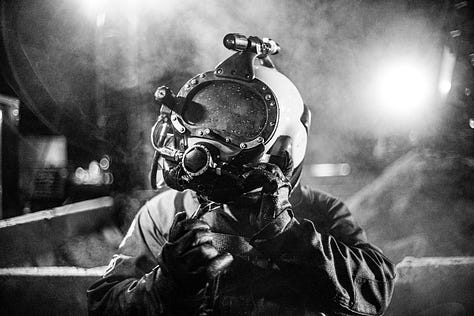
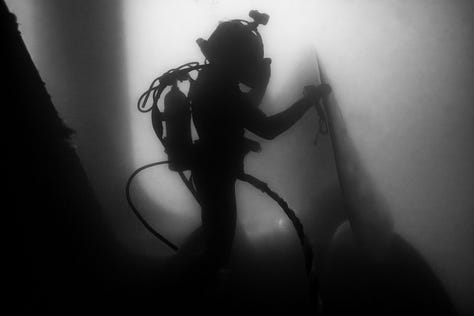
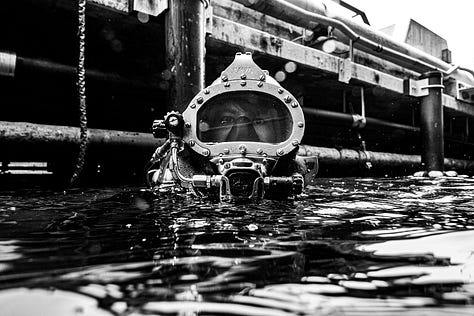
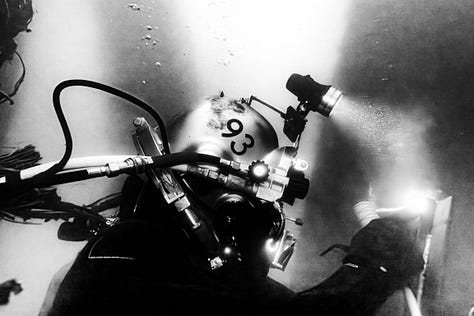
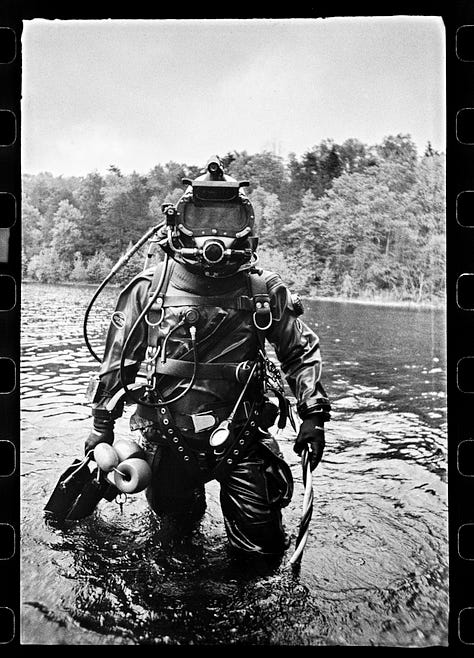

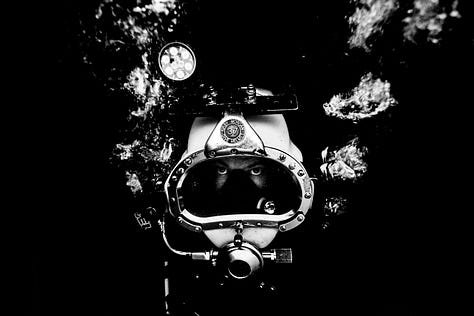
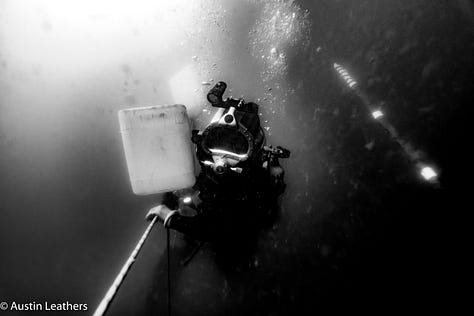
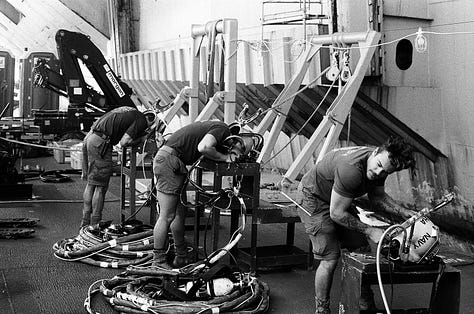
——————————
This ends Volume 25, Edition 1, of the Lethal Minds Journal (01 AUGUST 2024)
The window is now open for Lethal Minds’ twenty-sixth volume, releasing September 1st, 2024.
All art and picture submissions are due as PDFs or JPEG files to our email by midnight on 20 AUGUST 2024.
All written submissions are due in 12-point font, double-spaced, Word documents to our email by midnight on 20 AUGUST 2024.
lethalmindsjournal.submissions@gmail.com
Special thanks to the volunteers and team that made this journal possible:



